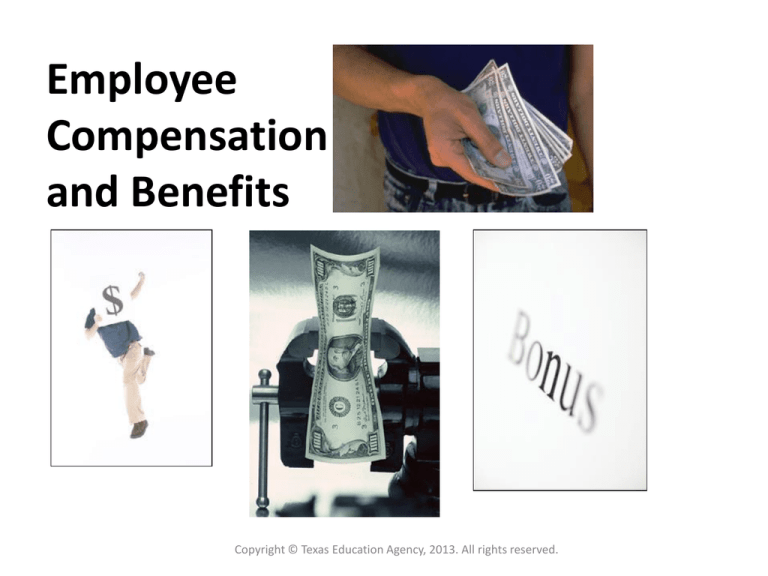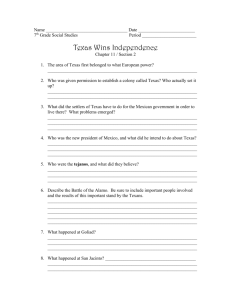
Employee
Compensation
and Benefits
Copyright © Texas Education Agency, 2013. All rights reserved.
“Copyright and Terms of Service
Copyright © Texas Education Agency. The materials found on this website are copyrighted © and trademarked ™ as
the property of the Texas Education Agency and may not be reproduced without the express written permission of the
Texas Education Agency, except under the following conditions:
1)Texas public school districts, charter schools, and Education Service Centers may reproduce and use copies of the
Materials and Related Materials for the districts’ and schools’ educational use without obtaining permission from the
Texas Education Agency;
2) Residents of the state of Texas may reproduce and use copies of the Materials and Related Materials for individual
personal use only without obtaining written permission of the Texas Education Agency;
3) Any portion reproduced must be reproduced in its entirety and remain unedited, unaltered and unchanged in any
way;
4) No monetary charge can be made for the reproduced materials or any document containing them; however, a
reasonable charge to cover only the cost of reproduction and distribution may be charged.
Private entities or persons located in Texas that are not Texas public school districts or Texas charter schools or any
entity, whether public or private, educational or non-educational, located outside the state of Texas MUST obtain written
approval from the Texas Education Agency and will be required to enter into a license agreement that may involve the
payment of a licensing fee or a royalty fee.
Call TEA Copyrights with any questions you have.
Copyright © Texas Education Agency, 2013. All rights reserved.
Compensation
• Compensation- the total amount of the
monetary and non-monetary pay
provided to an employee by an
employer in return for work performed
as required by the organization.
• Benefits- refers to compensation other
than an hourly wage or salary.
Copyright © Texas Education Agency, 2013. All rights reserved.
3
Goals of Compensation
• The package should be good enough
to attract the best people for the job.
• It also needs to stay competitive
enough to motivate employees to
stay with the organization. It’s not
the only component in motivating
people to stay, but it is certainly a key
component.
• Compensation can be used to
increase morale, motivation, and
satisfaction among employees.
Copyright © Texas Education Agency, 2013. All rights reserved.
4
Developing a Compensation Package
• A compensation plan needs to assist in the
development of a compensation strategy that meets
the goals of the organization; it also needs to be in
line with the organization’s strategic plan.
Copyright © Texas Education Agency, 2013. All rights reserved.
5
Internal and External Pay Factors
Internal Pay factors
•
•
•
•
•
•
Market compensation policy
Market Plus philosophy
Market Minus philosophy
Employer’s ability to pay
Type of industry
Value of the employee
and the job to the organization
External Pay Factors
• Current economic state
• Inflation and cost of living
Copyright © Texas Education Agency, 2013. All rights reserved.
6
Job Evaluation
• Job evaluation is a formal approach to
analyzing jobs and categorizing them
in regard to their relative worth in an
organization to determine pay
structure.
• The value of a job is a major factor
when determining pay.
Copyright © Texas Education Agency, 2013. All rights reserved.
7
Performing a Job Evaluation
•
•
•
•
Job ranking system
Paired comparison
Job classification
Point factor system
Copyright © Texas Education Agency, 2013. All rights reserved.
8
Pay Systems
• Pay Grading - the process of setting the pay
scale for specific jobs or types of jobs
• Delayering and Banding – gives more
flexibility
• Going rate model – analyzing the going rate
to determine what employees should be paid
Copyright © Texas Education Agency, 2013. All rights reserved.
9
Other Types of Pay Options
• Skill based pay - salary levels are based on the
employee’s skills as opposed to the job title.
• Competency based pay - approach looks at the
employee’s traits or characteristics as opposed to a
specific skills set.
• Broadbanding - similar to a pay grade system, except all
jobs in a particular category are assigned a specific pay
category.
• Variable pay - provides employees with a pay basis but
links the attainment of certain goals or achievements
directly to their pay.
Copyright © Texas Education Agency, 2013. All rights reserved.







